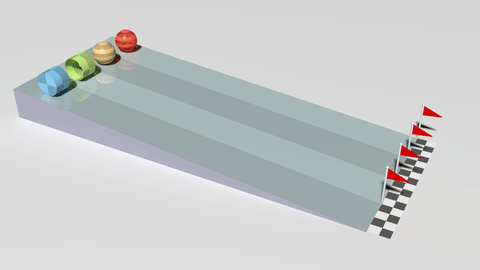| DescriptionRolling Racers - Moment of inertia.gif |
English: An object's moment of inertia I determines how much it resists rotational motion. In this simulation, four objects are placed on a ramp and left to roll without slipping. Starting from rest, each will experience an angular acceleration based on their moment of inertia.
The objects are, from back to front:
- A hollow spherical shell (red)
- A solid ball (orange)
- A ring (green)
- A solid cylinder (blue)
At any moment in time, the forces acting on each object will be its weight, the normal force exerted by the plane on the object and the static friction force. As the weight force and the normal force act on a line through each object's center of mass, they result in no net torque. However, the force due to friction acts perpendicular to the contact point, and therefore it does result in a torque, which causes the object to rotate.
Since there is no slipping, the object's center of mass will travel with speed  , where r is its radius, or the distance from a contact point to the axis of rotation, and ω its angular speed. Since static friction does no work, and dissipative forces are being ignored, we have conservation of energy. Therefore: , where r is its radius, or the distance from a contact point to the axis of rotation, and ω its angular speed. Since static friction does no work, and dissipative forces are being ignored, we have conservation of energy. Therefore:

Solving for  , we obtain: , we obtain:

Since the torque is constant we conclude, by Newton's 2nd Law for rotation  , that the angular acceleration α is also constant. Therefore: , that the angular acceleration α is also constant. Therefore:

Where, v0 = 0 and d is the total distance traveled. Therefore, we have:

For a ramp with inclination θ, we have sin θ = h / d. Additionally,  for a dimensionless constant k characteristic of the geometry of the object. Finally, we can write the angular acceleration α using the relation for a dimensionless constant k characteristic of the geometry of the object. Finally, we can write the angular acceleration α using the relation  : :

This final result reveals that, for objects of the same radius, the mass the object are irrelevant and what determines the rate of acceleration is the geometric distribution of their mass, which is represented by the value of k. Additionally, we observe that objects with larger values of k will accelerate more slowly.
This is illustrated in the animation. The values of k for each object are, from back to front: 2/3, 2/5, 1, 1/2. As predicted by the formula found above, the solid ball will have a larger acceleration, reaching the finish line first. |














